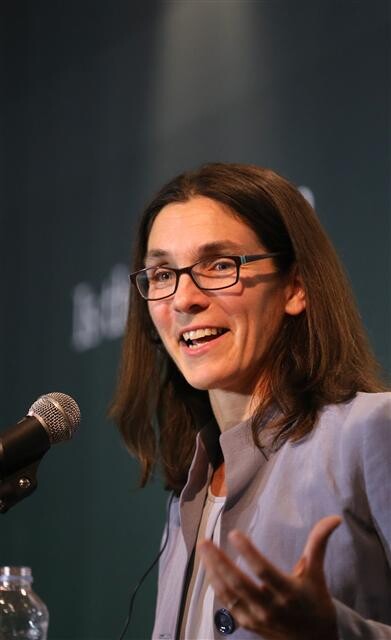hankyoreh
Links to other country sites 다른 나라 사이트 링크
[Interview] “I’m not pro-Korea or pro-Japan. I’m just a young academic who’s pro-history”

“I’m not pro-China, pro-Korea, or pro-Japan. I’m just a young academic who’s pro-history.”
Alexis Dudden, a professor at the University of Connecticut, drew a heated response when she spearheaded a joint statement by US historians last February opposing the Shinzo Abe administration’s attempts to misrepresent Japan’s historical actions.
“I got a lot of protest emails from Japan talking about how I was ‘pro-China’ or ‘anti-Japan,’” Dudden recalled.
“My favorite was one that accused me of being a ‘North Korean spy,’” she added with a wry smile.
Dudden‘s remarks came as part of a talk with reporters while visiting South Korea for Asan Plenum 2015, an event organized by the Asan Institute for Policy Studies.
A graduate of the University of Chicago, Dudden has studied in both South Korea and Japan. She is considered one of the US’s top experts on Northeast Asian history.
The statement, titled “Standing with Historians of Japan,” was signed by Dudden and 19 other members of the American Historical Association.
“As historians, we express our dismay at recent attempts by the Japanese government to suppress statements in history textbooks both in Japan and elsewhere about the euphemistically named ‘comfort women’ who suffered under a brutal system of sexual exploitation in the service of the Japanese imperial army during World War II,” read the statement‘s opening.
After its release, Dudden soon found herself facing emails containing death threats.
“I had expected there would be some hate mail,” she admitted.
“But I was surprised to see that big a reaction when these are all proven historical facts, and nothing new anyway,” she added.
Dudden recently issued a call for Abe to show more proactive reflection on historical issues during his US visit.
“We’re watching closely to see what words [such as apology or aggression] he doesn’t use and what actions [such as an apology] he doesn’t take after his Congressional address [scheduled for Apr. 29] is decided,” she said.
Dudden took particular issue with Abe’s recent use of the term “human trafficking” to describe the comfort women, while sidestepping any reference to the Japanese government’s responsibility.
“It‘s unfortunate that he did not specifically name who committed the act of trafficking,” she said.
Noting that a 1993 statement by Japanese Chief Cabinet Secretary Yohei Kono acknowledged the Japanese government’s responsibility on the issue, Dudden called for the Abe administration to also take action to clearly admit the state’s role.
By Kim Oi-hyun, staff reporter
Please direct questions or comments to [english@hani.co.kr]

Editorial・opinion
![[Editorial] Does Yoon think the Korean public is wrong? [Editorial] Does Yoon think the Korean public is wrong?](https://flexible.img.hani.co.kr/flexible/normal/500/300/imgdb/original/2024/0417/8517133419684774.jpg) [Editorial] Does Yoon think the Korean public is wrong?
[Editorial] Does Yoon think the Korean public is wrong?![[Editorial] As it bolsters its alliance with US, Japan must be accountable for past [Editorial] As it bolsters its alliance with US, Japan must be accountable for past](https://flexible.img.hani.co.kr/flexible/normal/500/300/imgdb/original/2024/0417/6817133413968321.jpg) [Editorial] As it bolsters its alliance with US, Japan must be accountable for past
[Editorial] As it bolsters its alliance with US, Japan must be accountable for past- [Guest essay] Amending the Constitution is Yoon’s key to leaving office in public’s good graces
- [Editorial] 10 years on, lessons of Sewol tragedy must never be forgotten
- [Column] A death blow to Korea’s prosecutor politics
- [Correspondent’s column] The US and the end of Japanese pacifism
- [Guest essay] How Korea turned its trainee doctors into monsters
- [Guest essay] As someone who helped forge Seoul-Moscow ties, their status today troubles me
- [Editorial] Koreans sent a loud and clear message to Yoon
- [Column] In Korea’s midterm elections, it’s time for accountability
Most viewed articles
- 1Samsung barricades office as unionized workers strike for better conditions
- 2[Column] The clock is ticking for Korea’s first lady
- 3[Editorial] When the choice is kids or career, Korea will never overcome birth rate woes
- 4Why Israel isn’t hitting Iran with immediate retaliation
- 5[News analysis] After elections, prosecutorial reform will likely make legislative agenda
- 6S. Korea, Japan reaffirm commitment to strengthening trilateral ties with US
- 7Japan officially says compensation of Korean forced laborers isn’t its responsibility
- 8[Editorial] As it bolsters its alliance with US, Japan must be accountable for past
- 9[Editorial] Does Yoon think the Korean public is wrong?
- 10[Guest essay] How Korea turned its trainee doctors into monsters